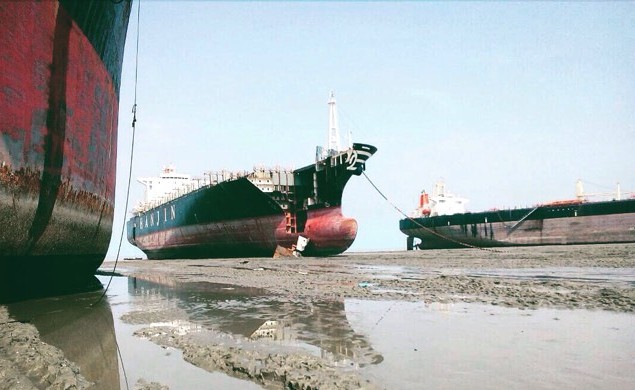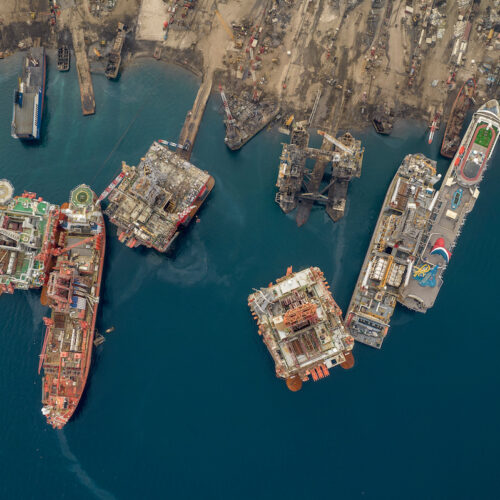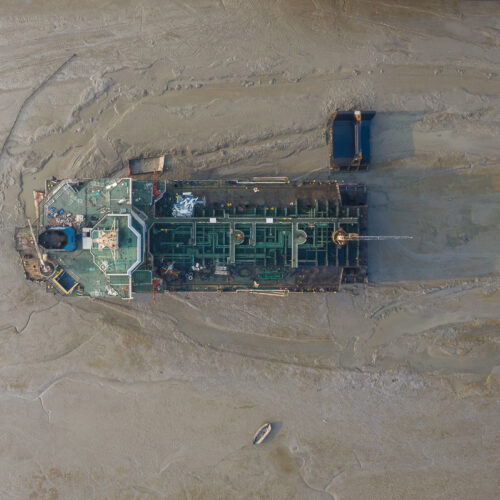Platform News – Worker killed when breaking the Hanjin Rome
And another worker dies in May at Chittagong yard with an appalling accident record
Two workers lost their lives at the Chittagong shipbreaking yards in the last two weeks, bringing the total death toll this year to six workers.
On 6 May, 26-year-old Shahinoor died at Jamuna Shipbreaking yard. He fell from a great height when he was breaking the HANJIN ROME, which was the first vessel arrested after the collapse of one of the largest container ship companies last year – the Korean company Hanjin Shipping. The HANJIN ROME was put up for auction by the High Court in Singapore to be sold to the highest bidder early this year. Unsurprisingly, the highest bids for buying ships for scrap come from cash buyers that sell to the South Asian beaching yards who can offer higher steel prices with minimal disposal and labour costs and safeguards. This is not the first time that courts, in deciding on bankruptcy cases, completely ignore the environmental and human repercussions of selling shipping assets to beaches, with the sole purpose of sorting out failed companies’ balance books. Deaths on the beaches have also been a direct consequence from bankruptcy cases in Germany, such as the sale of the KING JUSTUS to Alang and the VIKTORIA WULFF to Chittagong.
On 9 May, winch operator Ishaq was smashed by the wire cable and died on the spot at KR Steel. This is the second fatal accident this year at the plot – another fatal accident happened in February at BBC Shipbreaking yard which is under the same ownership as KR Steel. According to local sources, KR Steel was dismantling the vessels SEA ZENITH and KOTA WISATA when Ishaq was killed. The former was owned by the Thai shipping group Sang Thai & Sinsimon. The latter was owned by Singapore-based Pacific International Lines (PIL), one of the top containership operators in the world. PIL sent nine end-of-life vessels to the beaches of South Asia in the last four years. Six ended up in the worst yards on the shores of Chittagong.

Earlier this year the Institute for Global Labor and Human Rights (IGLHR) published a detailed account of the fatal accidents that killed 19 workers in Chittagong in 2016. The report includes interviews with workers that describe harsh conditions, lack of protective equipment, exposure to toxic gases and fumes, and a constant fear of dying at work: “There are enclosed dark places on the ship, where there is no ventilation. The cutters go in first [to cut holes in the sides to let light in]. Especially they get sick and nauseous,” a worker reports to IGLHR. “All of us cutters get sick from the chemicals. It always happens,” other workers add. “I work at night because the owner wanted me to work the night shift,” says a worker, adding “it is cooler. You sweat less. So for me, it is better. But it is more dangerous. That is the biggest worry: It is very risky. At any time, I could lose my life”.
Activists and workers in Bangladesh recently raised their voices on two important days for workers’ rights. On 28 April, the World Day for Health & Safety at Work, the Platform member Bangladesh Occupational Safety, Health and Environment (OSHE) foundation organised a rally and a human chain to raise awareness on the precarious conditions at the Chittagong shipbreaking yards. Workers affected by asbestosis or having suffered injuries joined OSHE for further discussions on how to strengthen claims for compensation. On 1 May Chittagong-based Platform member Young Power in Social Action (YPSA) organised a human chain and a rally gathering more than 100 workers and their family members.

In an attempt to hide the accident, the yard management kept the body of Shah Jahan inside the premises, but fellow workers and locals rushed to the site and started demonstrating. The body was consequently sent to the morgue of the Chittagong Medical College Hospital. The following day, the worker was quickly buried without a post mortem. Platform member organisations in Bangladesh attended the funeral and now seek to support the victim’s relatives. The family and the yard owners have settled for a one-off payment and a monthly allowance to help them cover their living costs. However, money will not be able to replace Shah Jahan who leaves behind a wife and a young child.

Related news

Press Release – Surge in number of accidents in Bangladesh shipbreaking yards
UPDATE PHP shipbreaking yard informed the Platform on 26 January 2018 of the following: The death of worker Harun Rashid, whose body was found in a… Read More

Press Release – Europe has capacity to recycle its ships, new data shows – yet shipowners want to use dangerous, polluting yards abroad
Ship recycling yards approved by the EU will have enough capacity to handle demand from EU-flagged ships that need to be scrapped, a new analysis shows. The… Read More

Press Release – Ship recycling in Aliağa under the spotlight
Our new report Ship Recycling in Turkey provides a comprehensive analysis of the current challenges faced by the ship recycling sector in Aliağa and also underscores the immense potential for driving forward sustainable practices.
... Read More
Platform publishes South Asia Quarterly Update #34
Seven workers suffered an accident on South Asian beaches in the second quarter of 2023.
... Read More
Press Release – Platform publishes list of ships dismantled worldwide in 2022
In 2022, 292 large tankers, bulkers, floating platforms, cargo- and passenger ships ended up for dirty and dangerous breaking on tidal beaches in Bangladesh, India and Pakistan.
... Read More
Press Release – Prosecutor launches investigation after Icelandic journalists shed light on illegal export of toxic ships to India
Kveikur uncovers the illegal export of two container ships. Ship owner Eimskip and cash buyer GMS under the spotlight.
... Read More

